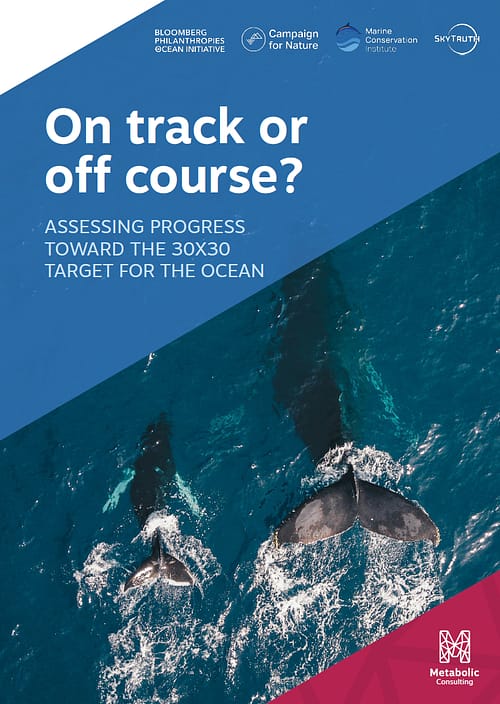Assessing progress toward the 30x30 target for ocean conservation
Are we delivering on the 30% protection of marine areas at the pace required? We helped answer this question ahead of the Biodiversity COP16
In this report, we assessed global progress toward the 30×30 target for ocean conservation, a commitment made under the Kunming-Montreal Global Biodiversity Framework (GBF) to protect 30% of the Earth’s land, freshwater, and the ocean by 2030. Metabolic, in collaboration with Bloomberg Philanthropies Ocean Initiative, Campaign for Nature, Marine Conservation Institute, and SkyTruth, provides insights into the current state of ocean conservation and offers five key recommendations to accelerate governmental action. These recommendations aim to inform discussions at the COP16 UN Biodiversity Conference in October 2024.
- Partners: Campaign For Nature, Marine Conservation Institute, Skytruth
- Client: Bloomberg Philanthropies Ocean Initiative
- Date: 17th October 2024
We are failing to meet the 30×30 target and effectively protect the ocean
The current state of global marine conservation reveals significant challenges in safeguarding the ocean’s rich biodiversity and ecosystems. Achieving 30% protection of the global marine area is crucial to meet the Global Biodiversity Framework (GBF) goal to halt and reverse biodiversity loss. However, merely increasing Marine Protected Area (MPA) coverage is not enough. There also needs to be a greater focus on enhancing the effectiveness of marine conservation by implementing higher quality standards and enforcing robust regulations. Currently, conserved marine areas make up 8.3% of the world’s total marine environment, but only 2.8% are likely effectively protected. This report aims to shine a light on the current status of marine protection, provide nuance to the numbers, and engage governments and relevant stakeholders to realign their efforts accordingly.
Using data-driven approaches to evaluate the current state of ocean conservation
We have drawn on the latest data (August 2024) from two leading conservation organizations, the Marine Conservation Institute (MCI) and SkyTruth, to evaluate national, regional, and global progress in marine conservation, including the effectiveness of this protection in delivering benefits to wildlife and coastal communities. In-depth desk research and interviews with experts and local stakeholders provided additional insights, highlighting case studies about conservation effectiveness, equity, and inclusion of Indigenous Peoples and local communities. From these insights, the report urges governments to follow recommendations in 5 critical areas to achieve the 30×30 target in the six years remaining before 2030.
Countries should do more and faster to reach the 30×30 target
This report presents data-driven insights on the state of ocean conservation, revealing how we are failing to meet the 30×30 target. Only 8.3% of the world’s ocean are protected and only 2.8% are of good enough quality for likely effective marine conservation. We recommend countries to accelerate their efforts, conserving more of their national seas and collaborating to protect more of the vast high seas. Conservation efforts must be of high quality, be equitable, and recognize the rights and roles of Indigenous Peoples and local communities. Wealthy nations must also give better financial support to developing countries. Released ahead of the COP16 UN Biodiversity Conference, in Cali, Colombia, where governments will review their progress on the GBF, this report aims to inspire transformative action, pushing for more ambition, action, and accountability in marine conservation.
"The successful implementation of 30x30 is imperative if we are to halt the rising tide of species loss globally. In particular, protecting and conserving at least 30% of the world’s ocean is vital to safeguard marine biodiversity and the billions of people who depend on it for their livelihoods and food security. It is also essential to preserving the ocean’s ability to act as our greatest climate ally by absorbing billions of tonnes of carbon emissions every year. [...] This report is appropriately launched ahead of the COP16 UN Biodiversity Conference, in Cali, Colombia, where governments will assess their progress on the implementation of the GBF. It is a gut check, a reality check, and a call to action.” - Excerpt from the report foreword John Kerry, Former Secretary of State of the United States of America, and José María Figueres, Former President of Costa Rica.










